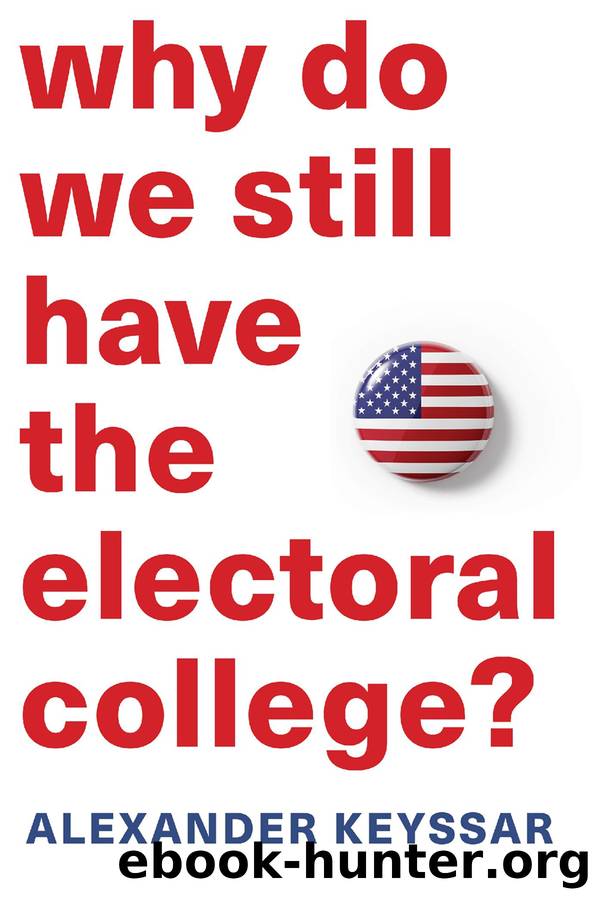Why Do We Still Have the Electoral College? by Alexander Keyssar

Author:Alexander Keyssar
Language: eng
Format: epub
Publisher: Harvard University Press
MINORITIES
Believe it or not, Mr. Chairman, we are arguing here for the status quo.
—Vernon Jordan Jr.
The direct popular election of the President and Vice President is an idea whose time has not only come, but is long overdue.
—John Lewis
In the spring of 1977, soon after Jimmy Carter had put forward his electoral reform package, Louis E. Martin, one of the most influential African-Americans in Washington, predicted that “the abolition of the Electoral College is bound to stir up a lively debate with black leaders taking different sides of the issue.” Martin knew whereof he spoke. A lively debate did indeed ensue among black leaders regarding the advantages and disadvantages, for African-Americans, of replacing the Electoral College with direct elections. Concerns about a national popular vote had, of course, been voiced in the late 1960s, by Clarence Mitchell among others, and the NAACP struggled with the issue in 1970, linking its worries about direct elections to the need to strengthen protections for voting rights in the South; its board finally endorsed direct elections in the early fall of that year. The issue then remained dormant in the early 1970s, receiving little attention from leaders or in the African-American press. After the 1976 election, however, the desirability of reform for minority groups became a prominent and consequential concern, not only in the African-American community but in the hearing rooms, and on the floor, of the Senate.63
As Louis Martin knew, African-American political leaders were deeply divided over Electoral College reform in the 1970s, as were black citizens nationwide. (See the polls cited earlier in this chapter.) The only African-American in the Senate, Edward Brooke, a Massachusetts Republican, was a co-sponsor of S.J. Res. 1 in 1977, although the failure of his reelection bid in 1978 meant that his voice would be absent from the final debates in 1979. Key black members of the House, including John Conyers, Augustus Hawkins, Shirley Chisholm, and Parren Mitchell (Clarence’s brother), favored direct elections, as did the nationally known activist John Lewis, who would become a member of Congress in 1987. But the Congressional Black Caucus was too divided to take an official position, and the leaders of many important African-American organizations, including Benjamin Hooks of the NAACP and Vernon Jordan Jr. of the Urban League, lined up in staunch opposition to reform, insisting that “the precious, though limited, political influence of black Americans would be curtailed under direct elections.”64
This opposing view—which lived in tension with the egalitarian ethos of the civil rights movement and the Voting Rights Act—was rooted in the perception that the Electoral College, with winner-take-all, encouraged presidential candidates to be responsive to the interests of African-Americans because they constituted a critical group of swing voters in large, northern states. Thanks to both their strategic geographic location and their tendency to vote as a bloc, African-Americans were able to wield power out of proportion to their numbers in presidential elections. According to the NAACP, that advantage was “justified and necessary” to offset the underrepresentation of
Download
This site does not store any files on its server. We only index and link to content provided by other sites. Please contact the content providers to delete copyright contents if any and email us, we'll remove relevant links or contents immediately.
| Elections & Political Process | Ideologies & Doctrines |
| International & World Politics | Political Science |
| Public Affairs & Policy | Specific Topics |
| United States |
The Secret History by Donna Tartt(16606)
The Social Justice Warrior Handbook by Lisa De Pasquale(11485)
Thirteen Reasons Why by Jay Asher(7779)
This Is How You Lose Her by Junot Diaz(5753)
Weapons of Math Destruction by Cathy O'Neil(5027)
Zero to One by Peter Thiel(4816)
The Myth of the Strong Leader by Archie Brown(4785)
Promise Me, Dad by Joe Biden(4439)
Stone's Rules by Roger Stone(4412)
Beartown by Fredrik Backman(4403)
How Democracies Die by Steven Levitsky & Daniel Ziblatt(4392)
The Fire Next Time by James Baldwin(4336)
100 Deadly Skills by Clint Emerson(4070)
A Higher Loyalty: Truth, Lies, and Leadership by James Comey(4024)
Rise and Kill First by Ronen Bergman(4008)
The David Icke Guide to the Global Conspiracy (and how to end it) by David Icke(3875)
The Farm by Tom Rob Smith(3869)
Secrecy World by Jake Bernstein(3773)
The Doomsday Machine by Daniel Ellsberg(3725)
